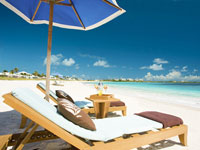 Sandals Emerald Bay is being credited as spurring a 60 percent rise in visitors on Exuma over the last two years.
Sandals Emerald Bay is being credited as spurring a 60 percent rise in visitors on Exuma over the last two years.
According to Fred Mitchell, minister of foreign affairs, visitor arrivals in Exuma are now just under 40,000 people per year. That reflects a rebound from only 21,600 stopover visitors in 2009, the year that Four Seasons closed.
Mitchell, speaking on behalf of Minister of Tourism Obie Wilchcombe at the Exuma Business Outlook (EBO), credited Sandals founder Gordon ‘Butch’ Stewart for pouring approximately $100 million into the resort since the takeover of Four Seasons. The presence of Sandals has spurred the revival the island needed, but both the public and private sector know there is still a long way to go.
“My task is not to focus on visitor arrivals gains or losses, but to draw to your attention the challenges we face and must overcome to ensure we have a thriving and sustainable tourism industry,” he said. “The minister of tourism has asked me to convey the things that ought to be done to secure sustainable business here in the Exumas.”
Mitchell outlined many of the points first revealed to Guardian Business by David Johnson, the director general at the Ministry of Tourism, prior to the opening of the EBO. The official highlighted the need for infrastructure, improved airlift, better roads and other transportation services as key areas of focus.
Lower utility costs, however, is perhaps one of the more immediate and pertinent issues of the day.
Earlier this year, Sandals voiced its displeasure with high operating costs that ate into its bottom line and made business difficult on the island. In fact, Mitchell revealed that Exuma has it far worse than resorts in the capital.
“The data examined by the Ministry of Tourism with one major resort show that although Nassau’s utilities, especially electricity costs, remain among the highest within the region, Great Exuma’s costs almost double those of Nassau on a per room, per night basis,” he announced.
The senior government official insisted that this situation cannot be absorbed and sustained, forcing customers to “simply choose to go elsewhere.”
The lack of dining options was also noted as a challenge for the island’s tourism product. The recent reopening of a restaurant at Grand Isle should go a long way to aiding this endeavor. The high-end community, located just down the beach from Sandals, has invested high six-figures into a new kitchen and restaurant, which is open to the public.
In the case of Sandals and Grand Isle, Mitchell dismissed the concerns of critics that larger resorts cannot work on the Family Islands. He said Exumians must “face the reality of our circumstances and chart a sensible course for development.”
“It is true that we must find the right balance. We must never sacrifice the secure, homely feeling of our Family Islands simply for the creation of income or wealth. However, we must properly plan where development might be invited, where population centers can be allowed to blossom and, on the other hand, which areas should be reserved for preservation and conversation,” according to Mitchell.

